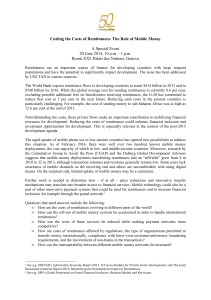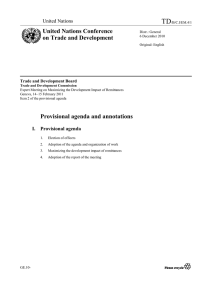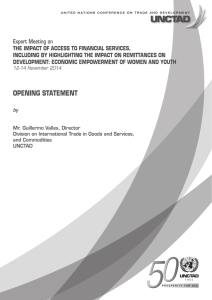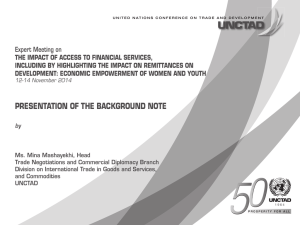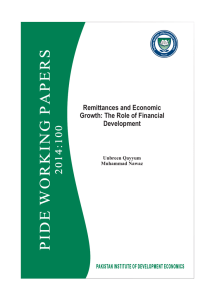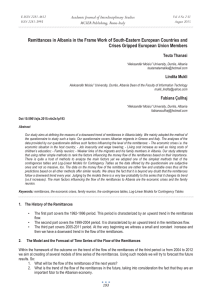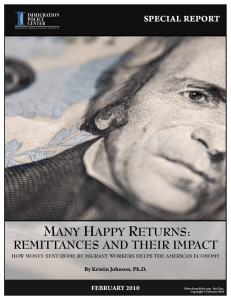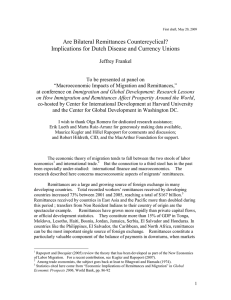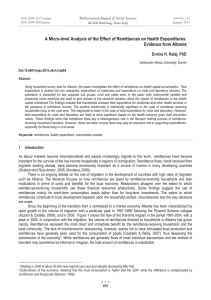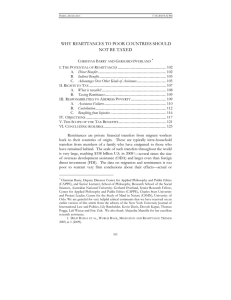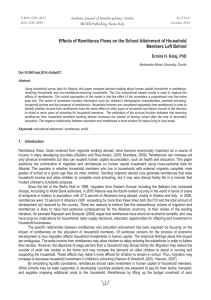TD United Nations Conference on Trade and Development United Nations
advertisement
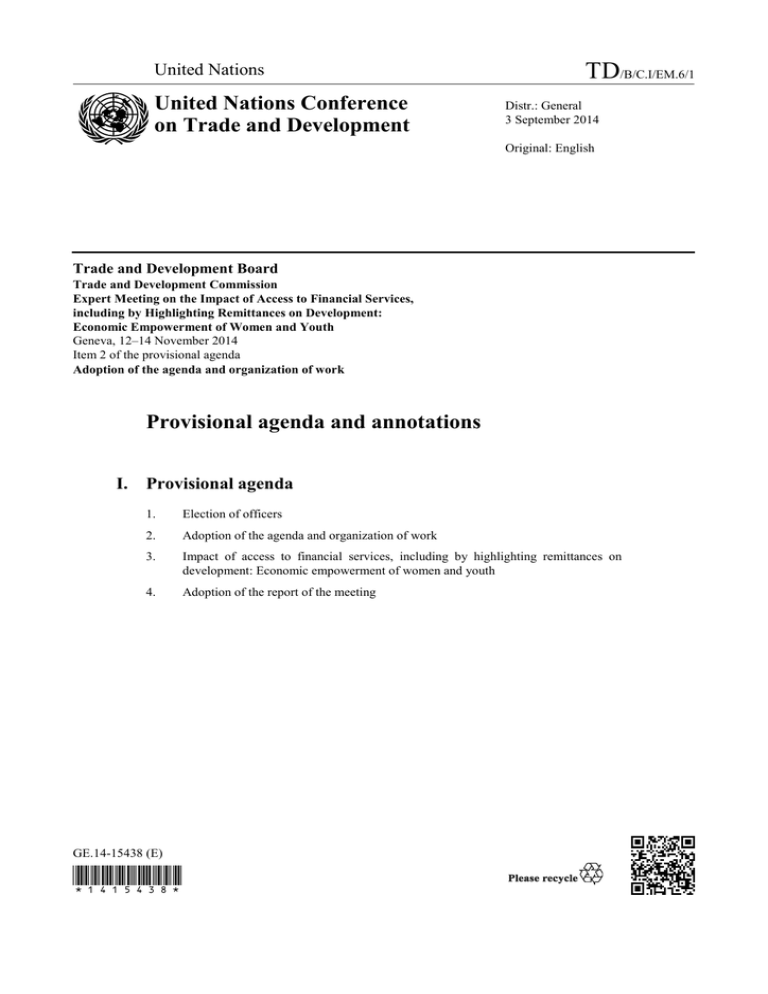
United Nations United Nations Conference on Trade and Development TD/B/C.I/EM.6/1 Distr.: General 3 September 2014 Original: English Trade and Development Board Trade and Development Commission Expert Meeting on the Impact of Access to Financial Services, including by Highlighting Remittances on Development: Economic Empowerment of Women and Youth Geneva, 12–14 November 2014 Item 2 of the provisional agenda Adoption of the agenda and organization of work Provisional agenda and annotations I. Provisional agenda 1. Election of officers 2. Adoption of the agenda and organization of work 3. Impact of access to financial services, including by highlighting remittances on development: Economic empowerment of women and youth 4. Adoption of the report of the meeting GE.14-15438 (E) *1415438* TD/B/C.I/EM.6/1 II. Annotations to the provisional agenda Item 1 Election of officers 1. It is recommended that the expert meeting elect a Chair and a Vice-Chair-cumRapporteur. Item 2 Adoption of the agenda and organization of work 2. The provisional agenda for the expert meeting is reproduced in chapter I above. A detailed programme will be available one week before the meeting. Documentation TD/B/C.I/EM.6/1 Provisional agenda and annotations Item 3 Impact of access to financial services, including by highlighting remittances on development: Economic empowerment of women and youth 3. The expert meeting is held in accordance with the decision taken by the Trade and Development Board at its fifty-seventh executive session on 26–28 June 2013. It will build upon previous expert meetings, including the Expert Meeting on Maximizing the Development Impact of Remittances and the Expert Meeting on Trade and Development Implications of Financial Services and Commodity Exchanges. The objective of the expert meeting is to identify national policies and practices that support improved financial access for the unbanked, particularly women and youth, with a focus on measures to record remittances through formal channels and improve data on these inflows. It also aims at providing a platform for public–private sector dialogue and cooperation on increasing access to financial services including remittances. The session will also seek to identify areas for further work by UNCTAD. These objectives will be pursued through an exchange of experiences and lessons learned so as to assist member States, in particular developing economies. 4. In many developing countries, lack of access to financial services as well as high transaction costs often pose significant challenges to people living in poverty. With the international community set to define a post-2015 development framework for sustainable development, financial inclusion has become an important issue on the international policy agenda as it has the potential to contribute to poverty reduction, economic and social development and financial stability. Many factors are at the source of lack of access to financial services – physical, economic, regulatory and cultural. The poor, women, youth, rural population and those engaged in the informal economy are particularly severely affected. The use of new technology and innovative business models that help overcome barriers to access could contribute to improved inclusion. As highlighted by major international summits and platforms, such as the United Nations High-level Dialogue on Migration and Development, remittances could be turned into a promising source of demand for financial services and contribute significantly to financial inclusion. This will require reducing the transaction costs of remittance transfers so as to ensure facilitated, safer and speedier transfers, including through the development of new financial products. Governments have an important role in implementing well-designed comprehensive policies. These include setting up sound regulatory frameworks and providing incentives 2 TD/B/C.I/EM.6/1 for extending supply and affordability of services, as well as creating an expanded demand for financial services, such as through financial education and consumer empowerment. 5. Building on the discussions undertaken and the recommendations made during previous expert meetings, including the Expert Meeting on Maximizing the Development Impact of Remittances and the Expert Meeting on Trade and Development Implications of Financial Services and Commodity Exchanges, the session will discuss the impact of financial access on small and medium-sized enterprises, microenterprises and individuals, particularly women and youth, and the means of improving access to financial services and reducing their transaction costs, including making remittances faster, safer and more secure, and maximizing their development impact. In this regard, the discussion will focus on policies and regulations that support financial inclusion through new technologies, such as mobile money schemes, on policy reforms that may ease the cost and complexity of access to financial services and on trade and competition policy options in financial and telecommunications services to improve financial access. 6. To facilitate discussion, the UNCTAD secretariat has prepared a background note. In addition, experts are encouraged to prepare case studies on the subject under discussion. These papers will be made available at the meeting in the form and language in which they are received. Documentation TD/B/C.I/EM.6/2 Impact of access to financial services, including by highlighting remittances on development: Economic empowerment of women and youth Item 4 Adoption of the report of the meeting 7. The report of the expert meeting will be submitted to the Trade and Development Commission at its next session. The expert meeting may wish to authorize the Rapporteur, under the authority of the Chair, to prepare the final report after the conclusion of the meeting. Input from experts Experts nominated by member States are encouraged to submit brief papers or case studies (approximately 5–12 pages) as contributions to the work of the meeting. The papers will be made available at the meeting in the form and language in which they are received. They should be submitted to the UNCTAD secretariat in advance of the meeting and addressed to Ms. Mina Mashayekhi and Mr. Aurangzeb Butt, Palais des Nations, CH-1211, Geneva, Switzerland; fax: +41 22 917 0044; e-mail: mina.mashayekhi@unctad.org and aurangzeb.butt@unctad.org. 3
